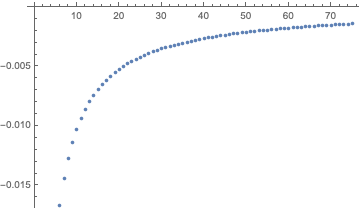Here is an identity for which I outlined two different arguments. I'm collecting further alternative proofs, so
QUESTION. can you provide another verification for the problem below?
Problem. Prove that
$$\sum_{k=1}^n\binom{n}k\frac1k=\sum_{k=1}^n\frac{2^k-1}k.$$
Proof 1. (Induction). The case $n=1$ is evident. Assume the identity holds for $n-1$. Then,
\begin{align*} \sum_{k=1}^{n+1}\binom{n+1}k\frac1k-\sum_{k=1}^n\binom{n}k\frac1k
&=\frac1{n+1}+\sum_{k=1}^n\left[\binom{n+1}k-\binom{n}k\right]\frac1k \\
&=\frac1{n+1}+\sum_{k=1}^n\binom{n}{k-1}\frac1k \\
&=\frac1{n+1}+\frac1{n+1}\sum_{k=1}^n\binom{n+1}k \\
&=\frac1{n+1}\sum_{k=1}^{n+1}\binom{n+1}k=\frac{2^{n+1}-1}{n+1}.
\end{align*}
It follows, by induction assumption, that
$$\sum_{k=1}^{n+1}\binom{n+1}k\frac1k=\sum_{k=1}^n\binom{n}k\frac1k+\frac{2^{n+1}-1}{n+1}=\sum_{k=1}^n\frac{2^k-1}k+\frac{2^{n+1}-1}{n+1}
=\sum_{k=1}^{n+1}\frac{2^k-1}k.$$
The proof is complete.
Proof 2. (Generating functions) Start with $\sum_{k=1}^n\binom{n}kx^{k-1}=\frac{(x+1)^n-1}x$ and integrate both sides: the left-hand side gives
$\sum_{k=1}^n\binom{n}k\frac1k$. For the right-hand side, let $f_n=\int_0^1\frac{(x+1)^n-1}x\,dx$ and denote the generating function
$G(q)=\sum_{n\geq0}f_nq^n$ so that
\begin{align*} G(q)&=\sum_{n\geq0}\int_0^1\frac{(x+1)^n-1}x\,dx\,q^n =\int_0^1\sum_{n\geq0}\frac{(x+1)^nq^n-q^n}x\,dx \\
&=\int_0^1\frac1x\left[\frac1{1-(x+1)q}-\frac1{1-q}\right]dx=\frac{q}{1-q}\int_0^1\frac{dx}{1-(x+1)q} \\
&=\frac{q}{1-q}\left[\frac{\log(1-(1+x)q)}{-q}\right]_0^1=\frac{\log(1-q)-\log(1-2q)}{1-q} \\
&=\frac1{1-q}\left[-\sum_{m=1}^{\infty}\frac1mq^m+\sum_{m=1}^{\infty}\frac{2^m}mq^m\right]=\frac1{1-q}\sum_{m=1}^{\infty}\frac{2^m-1}m\,q^m \\
&=\sum_{n\geq1}\sum_{k=1}^n\frac{2^k-1}k\,q^n.
\end{align*}
Extracting coefficients we get $f_n=\sum_{k=1}^n\frac{2^k-1}k$ and hence the argument is complete.

Best Answer
$\DeclareMathOperator\lead{leader} \DeclareMathOperator\prob{prob}$Answering a follow-up question by Per Alexandersson. Here is the $q$-version obtained by a suitable modification of the probabilistic proof of the OP identity.
We consider the linear space $X:=\mathbb{F}_q^n$ over a finite field $\mathbb{F}_q$. For $x=(x_1,\ldots,x_n)\in X\setminus {0}$ denote $\lead(x)=\max(i:x_i\ne 0)$, for a subspace $L\subset X$, $m:=\dim L>0$, denote $\lead(L)=\max_{x\in L} \lead(x)$. It follows from Gauss elimination that $L$ contains a basis $f_1,\ldots,f_m$, such that $\lead(f_1)<\lead(f_2)<\ldots <\lead(f_m)=\lead(L)$. Thus $L$ contains exactly $q^m-q^{m-1}$ elements $x$ for which $\lead(x)=\lead(L)$, and $q^{m-1}$ 1-dimensional subspaces $R$ for which $\lead(R)=\lead(L)$.
Choose a random subspace $L$ of $X:=\mathbb{F}_q^n$ with probability of $k$-dimensional subspace proportional to $q^{k\choose 2} y^k$ ($k=1,2,\ldots,n$). The sum of these weights is $(1+y)(1+qy)\ldots (1+q^{n-1}y)-1:=\theta_n$ (that's $q$-binomial theorem).
Then choose a random 1-dimensional subspace $R\subset L$ uniformly. Consider the following probability: $\kappa:=\prob(\lead(R)=\lead(L))$. On one hand, $$ \kappa=\sum_{k=1}^n \prob(\dim L=k)\prob(\lead R=\lead L|\dim L=k)\\ =\theta_n^{-1}\sum_{k=1}^n q^{k\choose 2}y^k{n\choose k}_q\cdot \frac{q^{k-1}}{[k]_q}, $$ where $[k]_q=1+q+\ldots+q^{k-1}$ is the number of 1-dimensional subspaces of a $k$-dimensional space over $\mathbb{F}_q$.
On the other hand, denoting by $X_k$ the $k$-dimensional subspace of $x\in X$ for which $x_{k+1}=\ldots=x_n=0$, we get $$ \kappa=\sum_{k=1}^n \prob(L\subset X_k\& \lead(R)=k)=\sum_{k=1}^n \prob(L\subset X_k)\cdot \prob(\lead(R)=k|L\subset X_k)\\= \theta_n^{-1}\sum_{k=1}^n \theta_k\cdot \frac{q^{k-1}}{[k]_q}. $$
Thus the identity (we multiply both expressions for $\kappa$ by $q\cdot \theta_n$) $$ \sum_{k=1}^n q^{k+1\choose 2}y^k{n\choose k}_q\cdot \frac{1}{[k]_q}=\sum_{k=1}^n \frac{q^{k}((1+y)(1+qy)\ldots (1+q^{k-1}y)-1)}{[k]_q}, $$ for $q=y=1$ we get the initial identity.